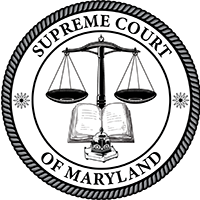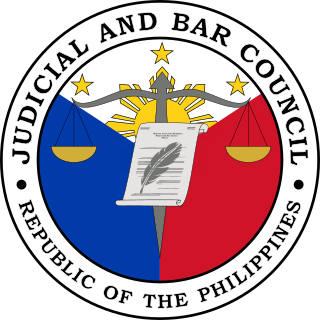Related Research Articles

An associate justice of the Supreme Court of the United States is a justice of the Supreme Court of the United States, other than the chief justice of the United States. The number of associate justices is eight, as set by the Judiciary Act of 1869.

The chief justice of Pakistan is the chief judge of the Supreme Court of Pakistan and is the highest-ranking officer of the Pakistani judiciary. The officeholder is the senior most of 17 justices of the Supreme Court of Pakistan.

The Supreme Court of Maryland is the highest court of the U.S. state of Maryland. The court, which is composed of one chief justice and six associate justices, meets in the Robert C. Murphy Courts of Appeal Building in the state capital, Annapolis. The term of the Court begins the second Monday of September. The Court is unique among American courts in that the justices wear red robes.

The Supreme Court of Florida is the highest court in the U.S. state of Florida. It consists of seven justices—one of whom serves as Chief Justice. Six members are chosen from six districts around the state to foster geographic diversity, and one is selected at large.

The Supreme Court of Nigeria (SCN) is the highest court in Nigeria, and is located in the Central District, Abuja, in what is known as the Three Arms Zone, so called due to the proximity of the offices of the Presidential Complex, the National Assembly, and the Supreme Court.
The Vermont Supreme Court is the highest judicial authority of the U.S. state of Vermont. Unlike most other states, the Vermont Supreme Court hears appeals directly from the trial courts, as Vermont has no intermediate appeals court.

The Judicial and Bar Council of the Philippines is a constitutionally-created body that recommends appointees for vacancies that may arise in the composition of the Supreme Court, other lower courts, and the Legal Education Board, and in the offices of the Ombudsman, Deputy Ombudsman and the Special Prosecutor.
An associate justice of the Supreme Court of the Philippines is one of fifteen members of the Supreme Court of the Philippines, the highest court in the Philippines. The chief justice presides over the high court, but carries only one of the 15 votes in the court. Traditionally, the chief justice is deemed primus inter pares among the justices.
The chief justice of Nigeria or CJN is the head of the judicial arm of the government of Nigeria, and presides over the country's Supreme Court and the National Judicial Council. The current chief justice is Kudirat Kekere-Ekun who was appointed on 22 August 2024. She was appointed acting chief justice of the Federation upon the retirement of incumbent chief justice, Olukayode Ariwoola. The Supreme Court of Nigeria is the highest court in Nigeria and its decisions are final. The chief justice of Nigeria is nominated by the president of the Federal Republic of Nigeria upon recommendation by the National Judicial Council and is subject to confirmation by the Senate of the Federal Republic of Nigeria. The CJN holds office at the pleasure of the Nigerian constitution and can only be removed from office by death or on attainment of age 70 whichever occurs first or by impeachment by the Senate of the Federal Republic of Nigeria which requires a super majority of the members of the Nigerian Senate.
Idris Legbo Kutigi was a Nigerian lawyer and jurist. He was Attorney General and Commissioner for Justice in Niger State before becoming a high court judge. He joined the Supreme Court of Nigeria in 1992 and served as Chief Justice from 30 January 2007 to 30 December 2009.

The nomination and confirmation of justices to the Supreme Court of the United States involves several steps, the framework for which is set forth in the United States Constitution. Specifically, Article II, Section 2, Clause 2, provides that the president of the United States nominates a justice and that the United States Senate provides advice and consent before the person is formally appointed to the Court. It also empowers a president to temporarily, under certain circumstances, fill a Supreme Court vacancy by means of a recess appointment. The Constitution does not set any qualifications for service as a justice, thus the president may nominate any individual to serve on the Court.

The Law of Nigeria consists of courts, offences, and various types of laws. Nigeria has its own constitution which was established on 29 May 1999. The Constitution of Nigeria is the supreme law of the country. There are four distinct legal systems in Nigeria, which include English law, Common law, Customary law, and Sharia Law. English law in Nigeria is derived from the colonial Nigeria, while common law is a development from its post-colonial independence.
The Lagos State Judiciary is one of the three co-equal branches of the Lagos State Government organized under the Constitution of Nigeria and laws of Lagos State. The Chief Judges are appointed by the State Governor with the consent of the House of Assembly.
The Chief Judge of Lagos State is the head of the Lagos State Judiciary, the judicial branch of the Lagos State Government and the chief judge of the High Court of Lagos State. From 1967 to 1973, the title was called Chief Justice of the Supreme Court. The appointment is often made by the Governor. "Section 271(1) of the Constitution provides that ‘The appointment of a person to the office of the Chief Judge of a State shall be made by the Governor of the State on the recommendation of the National Judicial Council, subject to the confirmation of the appointment by the House of Assembly of the State,’".
The National Judicial Council (NJC), is an executive body established by the Federal Government of Nigeria in accordance with the provisions of Section 153 of the 1999 Constitution as amended to protect the Judiciary of Nigeria from the whims and caprices of the Executive.

The Federal Court of Appeal of Nigeria is the intermediate Appellate Court of the Nigerian federal court system. The Court of Appeal of Nigeria decides appeals from the district courts within the federal judicial system, and in some instances from other designated federal courts and administrative agencies. As at 2010, there are 66 judges of the Nigerian courts of appeals authorized by the Senate. These judges are recommended by the National Judicial Council (NJC), nominated by the President of Nigeria and confirmed by the Senate. There are currently seventy-two Nigerian courts of appeals across the six geopolitical zones of Nigeria. There are 12 in the North-Central, 10 in North-East, 10 in North-West, 10 in South-South, 9 in South-East and 11 in South Western Nigeria. The headquarter is located at Three Arms Zone, Abuja.
The Rivers State Judicial Service Commission established under section 197 (1) (c) of the 1999 Constitution is the executive body that handles matters relating to appointment, discipline and promotion of Rivers State's judicial officers and their support staffs. It is chaired by the Chief Judge of the High Court of Rivers State.
Monica Bolna'an Dongban-Mensem is a Nigerian judge. She is the President of the Court of Appeal of Nigeria. Her appointment was confirmed on Thursday, 11 June 2020.

The Federal High Court of Nigeria (FHC) is one the Federal superior Courts of record in Nigeria. It has coordinate jurisdiction with the High Courts of the States of the Federation, including FCT. The headquarters is located in Shehu Shagari Way, Central District Abuja.
The Federal Judicial Service Commission (FJSC) is an entity established by Section 153 (1) of the Constitution of Nigeria of 1999, as amended. Its primary responsibility is to advise the National Judicial Council (NJC) on nominations for key judicial appointments. These include positions like the Chief Justice of Nigeria, Justices of the Supreme Court, President of the Court of Appeal, among others. The FJSC is empowered to recommend the removal of judicial officers and exercises control over certain court personnel.
References
- ↑ NJC Procedural Rules on appointments of judicial officers - National Judicial Council, 1999-05-29, retrieved 2020-07-27
- ↑ "Recruitment and Tenure of Supreme Court Justices in Nigeria".
- ↑ "Constitution of the Federal Republic of Nigeria". www.nigeria-law.org.
- ↑ "Nigeria Senate Confirms 8 Justices of the Supreme Court - The Guardian News Nigeria". 2020-10-13.
- ↑ Omogbolagun, Tope (22 December 2023). "Senate confirms 11 S'Court justices, urges more funding". The Punch . Retrieved 24 December 2023.
- ↑ Ogunseyin, Oluyemi (21 December 2023). "Senate confirms appointment of 11 Supreme Court judges". The Guardian . Retrieved 24 December 2023.
- ↑ Enumah, Alex (26 February 2024). "Finally Supreme Court Attains Full Complement of 21 Justices - THISDAYLIVE". This Day.